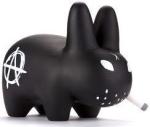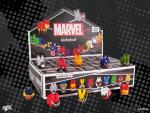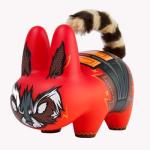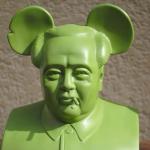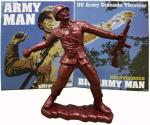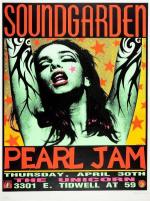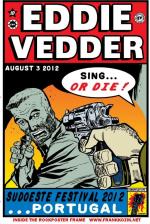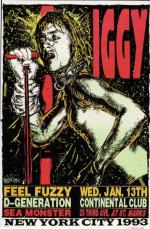On the eve of New York Comic Con, I’m doing a bit of catch-up on a piece that our good friend Jedd sent in several weeks back, during the Singapore Toy, Game & Comic Convention. It’s a great interview with designer toy icon Frank Kozik. Be sure to check out Jedd’s own site, The Movie and Me, for his full coverage of STGCC and much more.
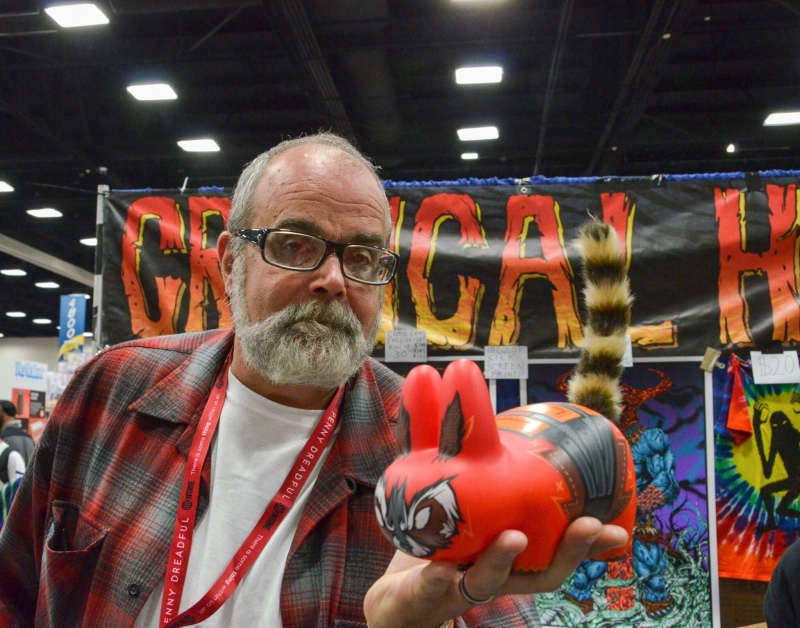
Artist and designer Frank Kozik is known in collectible art circles as the creator of the Labbit, but it also famous as a poster designer who created artwork for bands such as The White Stripes, Pearl Jam, The Beastie Boys and Nirvana. The commercial artwork he has done includes work for Nike, Swatch and MTV. Kozik was in Singapore as a guest of the Singapore Toys, Games and Comics Convention (STGCC) and I got to sit down with him to discuss his work. He was somewhat intimidating and frank and off-the-cuff, giving a detailed description of how Labbit came to be (it involves booty calls) and offering a surprising, piece of advice to aspiring artists.
Jedd Jong: What was the genesis of Labbit; how did you conceptualise that?
Frank Kozik: That’s an interesting story. In the mid-90s, I was going to Japan quite a bit, I was working with the people there. When I went over there for the first time, I was really in Sanrio products, was really into like Hello Kitty and Keroppi and stuff, I thought it was very interesting, the stuff they were doing. I liked how they did the characters, it was like super-perfect. What’s interesting is in Japan then, it was just something for low-class people. These were are sort of like snotty Shinjuku fashion dudes, right? And they’re like “what do you want to do, do you want to do cocaine on top of a mountain?” and I’m like “no, I want to go to Kitty Land!” And they all just thought I was crazy, they were like “what?!” They couldn’t understand, it was such a low thing for them. And I tried to explain it, I said “look, there’s something really interesting here. It’s like super-perfect way to develop a character,” like you got to get beyond who buys it. In the US, it became a really big cult thing.
So they were all making fun of me, we were in a bar and they said “maybe you can make your own character,” like I was the idiot, right? So I said “okay” and I did this little…it was actually a rabbit but it looked like my cat and I showed it to them and they all sort of were like “oh…that’s actually pretty good, maybe that’s going to work” and they all got kind of bummed out. So what I’ve done in my small way, we never have any mainstream advertising but in the last ten years or so, we generated over $20 million in revenue, which is pretty good for an independent thing, to make all that money.
That was my sort of experience and the whole thing with the Labbit was I wanted to make a Hello Kitty-type of character, but I also wanted it to reflect a little bit of punk rock, so kind of like the Labbit is like…you guys have the term “booty call”, you know what a booty call is? It’s like 3 in the morning and you f***, right? The Labbit is who Hello Kitty booty calls and Dear Daniel doesn’t know anything about it. He’s just like the dirty guy at the bar who’s kind of sexy and she’s like “okay, let’s have some fun” and then won’t talk to him for a few months and he doesn’t care. That was the kind of idea, a cute character who’s a little dirty, so it has balance. He can be a nice character, he can be a dirty character, he can be you when you’re in a bad mood, that kind of idea is what I tried to develop and I think it’s worked really well. In the United States, it’s become a very popular character and the appeal is going to regular people, a mainstream appeal is starting to happen. So it out as an experiment and like I said, there’s never been big money behind it, never done any kind of advertising, it’s just been a word of mouth, self-generated thing.
You’ve just come out with the Rocket Raccoon Labbit with the flexible tail…
The Rocket Raccoon character, it’s kind of a cool thing with the flexible tail with the wire in it. It’s done real well, the movie’s really popular and it’s a cool character.
And Rocket Raccoon is a dirty character who’s also cute!
Yeah, that does make sense.
What message did you set out to send with your Ultraviolence Toys line?
Those are totally personal so all the Ultraviolence stuff, which is like the political thing, the big army men and the weird s***, that’s just stuff I want to have. Like that’s something I want for my office or whatever, and since they don’t exist, I have to make them. And it’s expensive, I like them being manufactured, I don’t like one-of-a-kind art sculptures, I really wanted it to exist and actually have the manufactured model. So basically, I market and sell those just so I can have them. They’re totally personal and I thought “nobody would ever buy any of them” but they ended up doing really well, so that was kind of a bonus. That was the one thing with the toys that was purely just a personal sort of artist’s statement thing that ended up being kind of profitable.
So it wasn’t like a political statement that you were trying to send out?
Well, it’s more like my riffing on combining ideas and values in politics and things and also, if you want to get really serious about it, I’m really fascinated with like 60s pop art and like bad public art. There was a phenomenon in the United States in the 70s where there was a lot of horrible public art that was really expensive, you’d go downtown and there’d be a statue of a giant foot or something and those things are still around, they’re all like decayed and s***ty. So I had a fantasy that if I had been approached to do like a giant piece of public art for the waterfront, that would be it. So all of those kinds of…thoughts about politics and society, like cultures meeting, the Mao is really about that. The Mao is like “okay, he became the last emperor of China, but it’s a China he didn’t want.” Like he’s the emperor of the capitalist future. Hence it’s Mao, very formal, but the mouse ears represent western capitalism and the cigarette was because he was a heavy smoker, they were covering that up, so it’s him in his natural statue. Plus it looks cool, right? It looks nice, it has some presence.
Like with the army men toys, when I was a little kid I played with those army men toys and as a kid they seemed really big but as an adult they seem really small, so I wanted to have the feeling that the toy is really big again, so I made an exact copy of my childhood toys, I still have them. Even with the defects and the mould lines, like it was all in the sculpt. So the idea was that maybe an adult could recapture the feeling they had when they were a child, that the toy was a really big thing. So they’re all really personal things and as far as other people understand it, that’s the idea behind them.
Have you kept in contact with any of the bands you did art for in the early days?
All of them. You have to understand like I’m old. All those bands always had a first tour in a small club and nobody watched the show. I worked in those clubs, so all those bands that became famous, I worked in the club where they had their first tour, I did the local poster. I lived in Austin, a city in the middle of the country which was the only local city [the bands would stop at]. So all of the underground culture, the bands would travel from coast to coast and Austin was the only place they could stop, do a show, make some gas money, so every band would stop to do a show there. It was a small college town with many small punk clubs and rock clubs. So all the bands that became super-famous, you have to understand, they all at one point were just like four guys in a van with no money. I was just there at the right place at the right time doing local posters, working in the club, met them, watched the show, made friends with them, maintained contact. Later, when they became bigger, they needed a tour poster so yes, I met and hung out with all the bands, all of them.
Will you go back to poster design?
I still do posters, it’s like a hobby now. Last year, I did a bunch of Eddie Vedder posters, so I still do posters for Pearl Jam. A lot of bands have a huge cult following. There’s this band called 311, they’re like okay, I did their posters years ago. They have a huge cult following and their posters sell very well. They all work with like these merchandising companies so there’s no pressure, I can do whatever I want. And it’s fun to do, I don’t care whether or not it’s good for them anymore, basically I just play and actually the posters sell very well. I do fine art prints all the time.
What kind of music do you listen to these days?
I listen to boring new metal. There’s a new band, relatively new band called Weep and it’s kind of slowed-down, weird faraway vocals. They have a couple of albums out, they’ve got stuff on YouTube. J Mascis did this crazy metal band called Witch. And there’s a new band in England called Uncle Acid and the Deadbeats, they’re really great, they sound like they were recorded in the 1960s-70s, evil biker Satan rock music. So that’s kind of what I listen to, like new metal-y kind of s***. I don’t listen to any like punk bands. I like ambient stuff that’s weird, I’ll just come across stuff.
We’ve seen hand-drawn poster art, particularly for movies, on the decline. What do you think it will take for a revival of that?
There’s an enormous one going on right now in the United States. If you look at a couple of websites like gigposters and the Alamo Drafthouse Mondo poster series, it’s all hand-done, it’s all super-amazing, it’s a huge thing. There are hundreds of poster artists doing thousands of posters every year, it’s just not mainstream. The Alamo Drafthouse series, all that is is they show old movies and then hire artists to do new posters for them and then they market and sell those posters. That s*** is like astounding. So there actually has been an enormous revival over the last 15 years. The s*** you see will blow your mind.
The studios wouldn’t use them as the A-poster though.
Well, that makes it kind of cool. You have to understand you know, I do commercial artwork and post people don’t have good taste. Most people, like if you a really elaborate, beautiful hand-drawn thing, they’re not going to understand why it’s cool. They have no context. They don’t collect stuff, they don’t know the history of movie posters, they’re just people who watch television. So the public wants the movie studios to put the movie stars’ face [on the poster] because that’s all they see in the magazines and on TV. They don’t care if the poster is artistic, they want to go and see the movie, right? They’re not collectors, they’re not into art, they want to go and be entertained and see a movie with their favourite actor, they don’t care about anything else. People who come here and collect are different, so at least there’s an alternative underground.
It’s okay that it’s not the mainstream version because the mainstream won’t appreciate the effort anyway. There’s two worlds, so there something for each of them, I’m not going to say one is right and one is wrong. Maybe we’re all abnormal. Being a collector is not really a mentally healthy thing, believe me. So I’m not saying one is better than the other, it’s good that both exist, because what it does is it allows really crazy superhero movies to be made. I’m 52, when I was 17 years old, movies f***ing sucked! Star Wars came out and things started to change, but I remember going to the movies before Star Wars, it was nothing that great, like for a kid. Sure, there were great movies, but you had to be mature to understand it, as a kid movies kinda sucked. It’s different now, you go see something like Guardians of the Galaxy, f***ing mind-blowing. But it’s dependent on like reaching the mainstream audience because it costs a lot of money to make, I’m just happy both things exist.
And I’m glad Guardians did so well because so many people were saying “this is going to be the first flop for Marvel Studios…”
It was funny dude, they had charismatic acting, there was no story, it was like a comic book come to life. They weren’t trying to make it be logical or realistic or anything, it was just cool.
What kind of toys do you collect, do you collect the mainstream mass-market stuff too?
No. It’s changed over the years, I mean originally like starting in the late-70s, I was heavily into Bandai die-cast toys, like all the crazy toys based on TV shows, where it would be like “it’s a talking stove!” or whatever, “an ape-man!” And then, as I had more money, I started collecting the more intricate Bandai stuff, like the big Tetsujins. Bandai made really, really nice stuff in the 80s, all die-cast, all articulated, all magnetic, they made some crazy s***. From the little goofy stuff to like the huge…I was really into that for a long time, and then it got really expensive and I stopped collecting that and I actually sold my collection. Then I got into vintage tin space toys for a while, collecting those for a long time and those got more expensive, sold that collection.
I’m really into this company called Marx Toys, it was an American toy company from about 1920 to like the late ‘70s and they made some really amazing s*** over the years, like metal toys, plastic toys, all this kind of stuff, so I collected Marx playsets, they made these really great playsets. And then like I said in the 90s, in the late-80s, I started going to Japan to do stuff and I sort of got turned on to the Sanrio character thing. I got really into that. I never was into anime, I was never really into the Macross thing or Gundam stuff, too complicated. As time went on, I got more and more into simpler stuff, refined Japanese toys, simpler and simpler, sort of ultimate perfection stuff.
These days, I don’t really collect specifically anymore. Once in a while, I see something that [I like]. It’s got to be something really odd. My favourite toys are bizarre, generic toys, like it’s a weird s***ty toy from like Argentina, but it’s made in such a vacuum by like some weird dude in South America that it’s a super-perfect cartoon race car, it has no context whatsoever. Like the last 10 years, I really like collecting stuff that’s like entirely unknown, like some weird toy that some normal person made just to make money but somehow, it just came out really cool. They’re kind of hard to find, but I’ve got a nice collection of kind of weird [toys].
There was a small toy company in America in the 50s called the Erie Toy Company that was a normal place, a plastics and one year [they went] “we should make toys!” So they just made these bizarre, generic plastic toys out of hard plastic, but they’re like so generic it’s perfect. “It’s a truck,” “it’s a boat,” “it’s a race car.” They made this one thing, a clown car with an organ and a monkey playing it. And they’re like weird hallucination toys you’d see in a dream, because they didn’t know what they were doing. They sold them locally or some s*** like that or maybe they had some deal with a store. I’m not stuff like that these days, if that makes sense, where they’re just bizarre objects that don’t fit into any category. Lots of interesting like communist toys too, all the communist countries made toys, but it would be the weirdest design. It was like some dude in Poland going “I will make a toy for children”. Weird s*** like that, I’ll look on eBay and stuff like that. It’s not like there’s a whole bunch of them, they’re singles. They have to be weird and cheap. I have a really cool [bootleg] He-Man, that weird s***.
What is a day in the life of Frank Kozik like?
Really boring. I have a whole routine: I get up really early, I make a cup of coffee, I feed the cats, my wife is still asleep. I’m lucky my studio is the same neighbourhood as my house. I’ll walk to the park, go to work and just work 12 hours a day and then go home, have dinner and go to sleep.
Do you get artist’s block?
Never, never. I work every single day, 12 hours a day, I’m always productive. I’ve never had a day I didn’t work.
If you weren’t designing toys and posters, what would you be designing?
Everything. What I do is I have a large studio with different areas, so I can do digital work, sculpting, I can cast resins, I paint my own toys, I have a painting area for fine art, a drawing area and so I have a schedule. I have a production schedule, I’m always getting jobs, I’m always planning releases so I have a very elaborate schedule like 5 months in advance and it will be like “Monday I have to do these 5 things, Tuesday I have to do this, Wednesday I spend all day working on that” so there’s a schedule and I just go and work every single day. I do all my social media like in the morning usually, I do all my social media work for an hour a day, I have a lot of followers. I’m on Twitter, Instagram and have two Facebook pages and they all require a different approach, different kinds of people on different social media. I have to do all my business calls, every day is very, very full.
For those who want to turn their artistic hobby into a career, what advice do you have?
Don’t do it. No, seriously, become a doctor or a lawyer, something where there’s a health plan and a pension. There’s too much competition. I’m lucky I started before the internet, that was never a good situation but today, it’s a blessing and a curse. There is so much competition and everybody is really, really good, so it’s become noise. It’s like unless you’re very lucky or have a very good idea or have a rich family, it’s impossible. If you have to do it, do it. But my advice for someone who’s like “I don’t know what to do” is “no, no, go be an engineer.” You know what I’m saying?
Singaporean parents will agree.
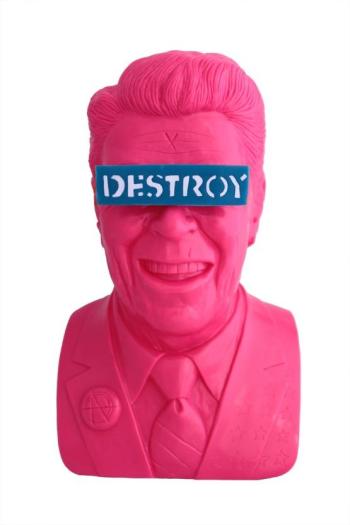 The thing is, the odds are like getting struck by lightning. It’s like yes, there are a few hundred people who can make a living being creative, but that’s it man. There’s no room for it. And I’m talking like both America and Europe, there’s only 2-300 of us. Every year, it’s very heart-breaking because in North America, going to art school is very expensive. It costs hundreds of thousands of dollars, so many families will do that and the schools don’t teach you anything, it’s totally f***ing bulls***. So the kids come out of art school, there are no jobs for them, they’re in debt, it’s idiotic. I go to give lectures in schools and the first thing I say is “drop out of the school. Tell your parents to rent you a work space and buy you tools and just start making s*** because your chances of having a career will be better if you do that than if you spend four years in school doing nothing and then getting out with debt. No one’s going to hire you. There are no jobs.”
The thing is, the odds are like getting struck by lightning. It’s like yes, there are a few hundred people who can make a living being creative, but that’s it man. There’s no room for it. And I’m talking like both America and Europe, there’s only 2-300 of us. Every year, it’s very heart-breaking because in North America, going to art school is very expensive. It costs hundreds of thousands of dollars, so many families will do that and the schools don’t teach you anything, it’s totally f***ing bulls***. So the kids come out of art school, there are no jobs for them, they’re in debt, it’s idiotic. I go to give lectures in schools and the first thing I say is “drop out of the school. Tell your parents to rent you a work space and buy you tools and just start making s*** because your chances of having a career will be better if you do that than if you spend four years in school doing nothing and then getting out with debt. No one’s going to hire you. There are no jobs.”
If you want to be a real creative, like “I want to be like a guy in an advertising firm that specializes in some bulls***” then yes, you can go to school and you can do that, but if you want to be an artist, the only way to do it is you have to just work a lot. Sitting in a class is not going to do it for you, no one cares about your portfolio, no one cares that you’ve got good grades because who are you? When you get out of school, you are nobody. You have no access to work space or materials or anything, so why do you waste the money? If your parents are willing to pay for school, they should be willing to go “f*** it, here’s the money, start a business”. This is my experience, because a lot of people want to do it. It’s like [how] everybody wants to be in a band but there can only be like 20 top bands. Time goes by fast and there’s a lot of competition. But by all means, if you really want to do it, do it. Dude, I’m 52 and I still have to work all day. It’s not like you get to retire or something. You’ve got money in the bank and everything but you’ve got no pension, every day I have to make something fresh.
Like Bill Mantlo, the writer who co-created Rocket Raccoon, said “don’t be a creative, become the people who are the exploiters because the creatives get exploited.”
Yeah. Over the years, I’ve learnt to exploit myself. It works okay.

